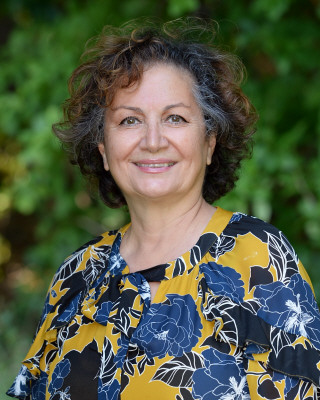
Jun 2, 2021 | Emma Drzala, Faculty Departures
By Emma Drzala (V)
After working at Pingry for thirteen years, Mrs. Homa Watts has announced that she will be stepping down from her position as a second grade teacher. Throughout her time at Pingry, Mrs. Watts has taught kindergarten, first grade, and second grade.
Mrs. Watts earned her BS from Tehran University in Iran, and her Masters Degree from Western Illinois University. After completing her education, Mrs. Watts taught at both the Sundance School in North Plainfield and the Kent Place School in Summit before teaching at Pingry starting in 2006. In 2013, Mrs. Watts opted to take two years off to live in the United Arab Emirates. She continued her teaching career in the UAE at a local school for the first year and privately tutored for the second year. She returned to Pingry in 2015.
Mrs. Watts has greatly enjoyed her time teaching at Pingry. She says that she has “never regretted making the choice of being a teacher. [She] considers teaching an honorable profession” and “would like to help new teachers to become even better teachers than they already are. Mentoring young teachers is not only [her] passion, it is [her] responsibility.” Mrs. Watts looks forward to spending time with her grandchildren and traveling throughout Europe and Canada with her husband and Pingry music teacher, Dr. Kenneth Watts. Looking back at her time at Pingry, Mrs. Watts cherishes the memories she has made with her students and colleagues. One of her most notable memories was when a family of foxes declared the area under a slide as their own, and consequently, students were not allowed in the playground for nearly two months. She believes that instances like these show how seemingly insignificant moments make the biggest impact.
Mrs. Watts’ retirement is a bittersweet occasion for many of us at Pingry. She is a great teacher who leaves behind a monumental legacy, and she has touched the lives of a generation of students for over fifteen years. As a former student of hers, I look forward to seeing her again and hearing about all of her future endeavors. We thank you for your dedication to the students at Pingry and we will miss you greatly, Mrs. Watts!
Jun 2, 2021 | Emma Drzala, Faculty Departures
By Emma Drzala (V)
As the 2020-2021 school year comes to a close, Ms. Patty Finn has announced her retirement from the Lower School. After teaching at Pingry for thirty-seven years, Ms. Finn describes the Short Hills music room as her “happy place.” She has worked with students ranging from Kindergarten to Grade 3, as well as with Grade 4 students learning the flute and Grade 5 handbell players. During her years at Pingry, Ms. Finn has worked with numerous colleagues in the Arts Department, including fellow lower school music teachers Mr. Thomas Berdos and Ms. Emma Liu, and high school teachers Dr. Andrew Moore and Mr. Jay Winston.
Prior to working at Pingry, Ms. Finn studied at both Douglass College and Rutgers Graduate School for a degree in musical education. Her studies were augmented by multiple Orff workshops, a session at the College of Piping on Prince Edward Island, and additional classes at the Gaelic College in Nova Scotia. These additional courses serve as proof to her students that a person’s education is not limited to just college and graduate school: there is always more to learn. This past year, Ms. Finn has played the flute in her church, as well as continuing to teach music in her local library. She has found herself giving private lessons to those looking to explore and expand their musical capabilities.
Looking back, Ms. Finn found it hard to choose a single moment that defined her time at Pingry, but she said she will always think back fondly to the annual performance of “This Day of Peace” during the holiday concert. Ms. Finn explained her love for this performance, expressing that “there is nothing better than the voices of 300 children raised in song.” She will forever cherish the relationships she forged with the students and faculty at Pingry and considers herself fortunate to “have spent [her] life making music.” As a former student of Ms. Finn’s, I will say that she will be greatly missed as a valued member of the Pingry community, and we all wish her well in her future endeavors!
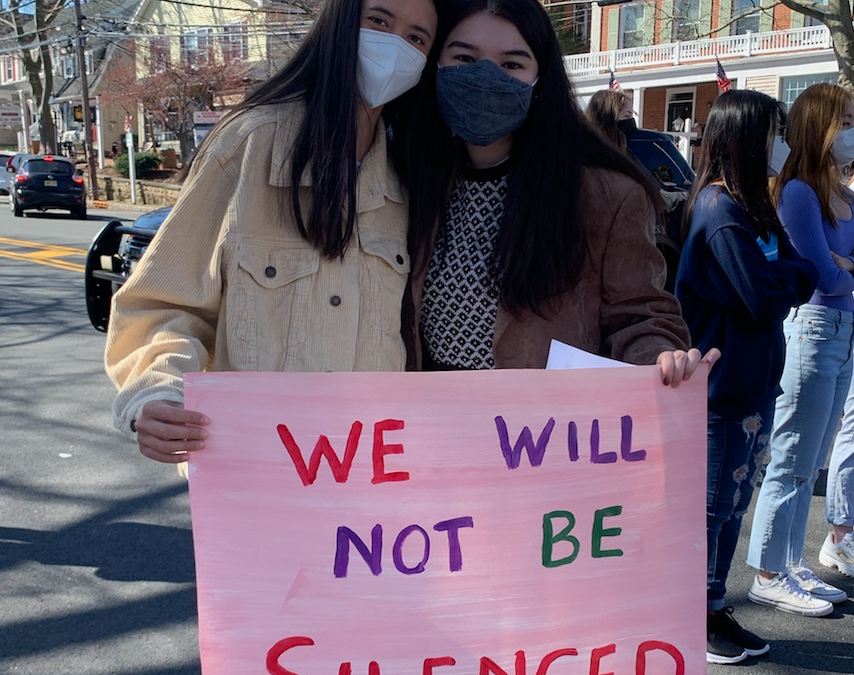
Apr 21, 2021 | Monica Chan, School News, Sidebar News
By Monica Chan (VI)
Over the course of the last three months, there have been a string of violent attacks and murders against members of the Asian-American and Pacific Islander (AAPI) community across the country, bringing about deep pain and grief to their families and the AAPI community at large. These crimes are by no means a new topic as hate crimes against Asian-Americans have been on the rise ever since the beginning of the pandemic; however, the successive violent murders and attacks in recent months have caught national attention due to their shocking severity.
On March 16, eight people were murdered in a mass shooting across multiple Asian-owned massage parlors in Atlanta, Georgia: six of the eight victims were Asian-American. More is being revealed about the victims and their individual stories, and the United States flags were ordered at half-staff until March 22 to honor the victims: Soon Chung Park, Hyun Jung Grant, Suncha Kim, Yong Ae Yue, Delaina Ashley Yaun, Xiaojie Tan, Daoyou Feng, and Paul Andre Michels. While this is by far the most lethal event in the string of anti-Asian crimes that have occurred over the last year, it certainly is not the first. The attacks against Vicha Ratanapakdee, who was killed while walking outside in San Francisco; Ee Lee, who was sexually assaulted and then murdered in Milwaukee; and Noel Quintana, who was slashed across the face with a knife in the New York City subway, are just a few of many.
These attacks and the lack of backlash against them have left many Asian-Americans feeling angered and cheated by a judicial system that does not seem to defend them. Police departments across the country have announced multiple times that many of these attacks will not be investigated as hate crimes. Because of this, AAPI leaders have been organizing multiple rallies and vigils in New York City, Oakland, Atlanta, and other cities. At Pingry, there have been multiple forums for Asian and non-Asian students to discuss and process these events, including a forum planned for Asian parents and caregivers to speak with Diversity, Equity, and Inclusion (DEI) Director Mr. Gilbert Olvera and Head of School Mr. Matt Levinson. The Asian Student Union has been working very closely with Mr. Olvera and Assistant Director of DEI Ms. Alexa Lopez to ensure that the Asian community at Pingry feels heard and included. Jeremy Lin (VI), a co-founder of the Asian Student Union, said, “Whether it is making a heartfelt speech on stage in front of the entire school to holding meetings for our community to come together and discuss these issues, we are trying to spark that same flame and passion in our underclassmen. In Asian cultures, the concept of going against authority and causing trouble is frowned upon; however, our actions as ASU leaders represent the risks we are willing to take. I hope this inspires students to take risks, go outside of their comfort zones to fight for what they truly believe in.” At the second school-wide meeting addressing the recent rise in violent hate crimes, there were over 300 students and faculty in attendance.
It is moving to see how many people we have supporting us, whether they are Asian/Asian-Americans themselves or allies. Lin adds that he hopes “to come back and see the same interest in social justice throughout Pingry’s student community after we have graduated.”
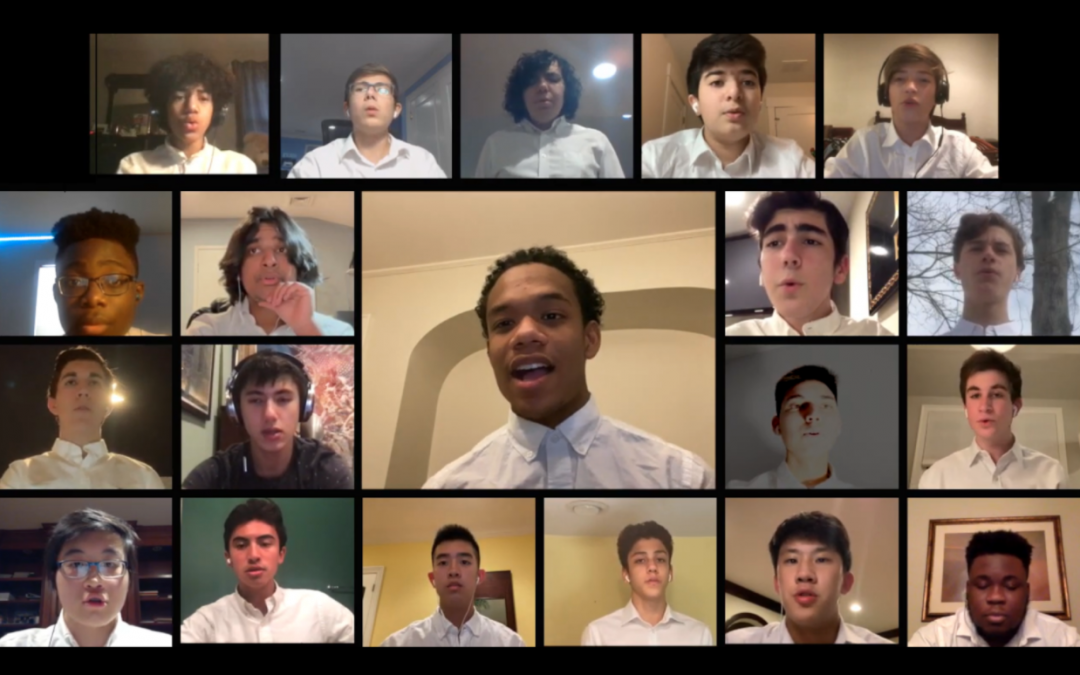
Apr 21, 2021 | Brian Li ('22), School News, Sidebar News
By Brian Li (V)
Every year, the Buttondowns and Balladeers, led by Dr. Andrew Moore and Mr. Jay Winston respectively, provide Valentine’s Day Serenades around the Upper School, as they belt romantic songs to unsuspecting individuals. However, due to the restrictions amid the ongoing pandemic, the process for this year’s serenades needed to be revised.
After careful deliberation, the solution involved virtual serenades that would be pre-recorded and played back to faculty, staff, and students who received one. Each acapella member would record their own voice part by playing a click track of the song in one ear and singing along. By using the click track, every recording could be synchronized. Then, the recordings were sent to Paula Roper, an editor that Dr. Moore has worked extensively with in the past. Roper and her son Eric, who works for Apple, created a video for each song by displaying the recordings of each choir member next to each other in a grid format.
The Buttondowns recorded four songs, each arranged by president Ore Shote (VI); these included “Baby” by Justin Bieber, “Grenade” by Bruno Mars, “My Girl” by The Temptations, and “I Want It That Way” by the Backstreet Boys. The Balladeers’ song options were “Electric Love” by Børns, “Valerie” by Amy Winehouse, I Won’t Say I’m in Love” from the film Hercules, and “Easy Love” by Alivia Clark (V).
The recordings were distributed through a variety of avenues, one of which involved the Balladeers/Buttondowns joining a class’s Zoom meeting and then presenting the video by sharing their screen. For those who received serenades individually, a choir member simply played the recording on a laptop for them. According to Dr. Moore, the best method, after multiple trials, was by “sending [the serenades] to a Zoom address and hav[ing] the seniors go into the class to watch the reactions.” In addition, those who ordered serenades after the deadline were still able to receive the recordings by email. Each serenade cost $5 and around $100 were raised in total. The proceeds will be donated to Morris Habitat for Humanity in support of families in need.
Despite the success of the virtual serenades, there were areas that could be improved in the future. Since the songs were recorded over a three-week period and finished during the week of Valentine’s Day, Dr. Moore noted that recording earlier might have provided extra leeway for editing, redoing recordings, and more. Furthermore, “it might [have been] nice to have a student do the editing if they had the time and appropriate skills.” In order to prepare teachers for the unavoidable interruption of class due to serenades, also allowing them to complete a survey to choose which day of the week is best may also be introduced next year.
COVID-19 serenades were, overall, a huge success and are truly a testament to the adaptability, creativity, and resilience of the Pingry community.

Feb 19, 2021 | Editorial, Meghan Durkin
By Meghan Durkin (VI)
If you’re a golf fan like me, you spent your Super Bowl weekend watching the Waste Management Phoenix Open—and yes, the game as well. Perhaps, the biggest storyline of the tournament was an unlikely, yet familiar, name at the top of the leaderboard going into Sunday: Jordan Spieth. Spieth, a three-time Major champion, who was once ranked the world’s No. 1 golfer for 26 consecutive weeks, hasn’t won a tournament since 2017, a three-and-a-half year dry spell that has seen him fall out of the top 50 in world rankings. At the Phoenix Open, for the first time in far too long, Spieth looked like the player of old: he had a career-high ten birdies in Saturday’s round and went into the final round tied for first at 18 under par. As a fan of Spieth’s, and of golf, it was exciting: a potential resurgence of a top talent who seemed to have lost his game. A win, however, was not in the cards for Spieth, who played a lackluster final round and finished fourth. I was disappointed, to say the least.
But, Jordan Spieth’s almost-win reminded me of what I love so much about sports: the comeback. There is nothing like watching a once-great talent re-emerge from defeat to reclaim their past glories. Think Tiger Woods’ 2019 Masters victory, his first Major title since the 2008 U.S. Open. Or, think of Shaun White claiming his third Olympic gold medal at PyeongChang in 2018, following a fourth place finish four years earlier. For a more recent “comeback,” and if you’re more of a soccer fan, think of John Stones’ resurgence in Manchester City’s first team this season.
Like Spieth, many more athletes continue to push for a concrete comeback of their own. Take Serena Williams, who is facing a career downturn following the birth of her first child. Williams has lost her last four Grand Slam finals, a stat that has slowed her chase of the all-time Grand Slam singles’ titles record. While failing to hold this record will likely weigh little on her already stacked legacy as a player, her accomplishments, at least to fans, feel incomplete.
Maybe this is unfair, but the truth is, the story of a comeback never fails to be a great one, especially for the fans. Sports, in its mirroring of life, presents the ultimate lesson of “you can only be on top for so long.” For professional athletes, success is hard to earn, yet so easy to lose. Being at the pinnacle of one’s sport and the height of one’s career, almost always ends unforgivingly and without return. Thus, when fans are invited to witness the return of a talent and player they grew to adore, the feeling is nothing less than elation, and the story worthy enough to be front-page news.
Unfortunately, no—we can’t all be Tiger or Serena, but I’d like to think we all have fans rooting for our comebacks too (albeit many less). As the greats would tell us: in times of success, when our putts are sinking and shots dropping, we have to grab at every opportunity; we have to take our moments and squeeze everything out of them. And inevitably, when our good luck relinquishes and we’re off our game, we have to know: our fans are behind us; our people are pulling for us. Just ask Spieth, Williams, White, or Woods: everyone loves a comeback, even one for you.

Feb 19, 2021 | Editorial, Noah Bergam
By Noah Bergam (VI)
A gentle chorus of crackling leaves caught my attention on a midday walk. It was a curious, contradictory sound, a fractal hum of tiny collisions. I walked across the curb, took three steps into the edge of the icy forest, and looked for the culprit in the autumn detritus. Nothing. I tried to blink away the quarantine eye strain. Still nothing, yet the hum intensified. When I turned back to the street, I saw the pavement dancing with miniscule ice pellets, white crystals popping in and out of solid existence.
I smiled. The clouds caught me by surprise with their absurdity. I wanted revenge. A childish urge brought me back to the curb, in search of a sizable piece of hail. Drivers passed me by with confused looks as I patiently combed the cold asphalt for something worthy. Searching, searching––jackpot!
I showed it to my mother. It was a beautiful crystal, about a centimeter in diameter, chiseled like a true polyhedron. It was incredible how slow it was melting. Come to think of it, it didn’t really melt at all.
This isn’t ice, she told me. It’s road salt.
It took her about five seconds to notice the discrepancy. Meanwhile, I held the crystal for about five minutes in my glove, with the firm belief that it was ice.
Nature: 2. Noah: 0. In this dramatic turn of events, I wasn’t quite sure how to feel. I wanted to laugh it off, but I also felt a dire need to understand the mental glitch which led me to this moment. I felt a tinge of that self-correcting hysteria that every Pingry student knows so well: the pain of the stupid mistake. The arithmetic error, the glaring typo, the misread question. In the craft of perfection, from 1600s to 36s to A+s, stupid mistakes must be rooted out ruthlessly. They cannot be treated as inevitable, even as every stupid mistake inevitably stems from the same essential quality: stubborn conviction.
Of course, when it comes to career paths like airplane pilots and police officers, the mindset of perfectionism is not just admirable but societally necessary. However, in the context of academics and pedagogy, when ideas and curiosity are at stake rather than people’s lives, I think it’s important to lighten up on our approach to stupid mistakes. It’s healthier for students to expect to incur stupid mistakes in their educational careers, to value original conviction more than painstaking perfection. Of course, the way most curricula are structured––at Pingry and beyond––this is not a reasonable expectation. Test-taking is a fundamentally perfectionist pursuit, designed to help us strangle our stupid mistakes and fit our thinking to the model laid out in front of us. If we want to encourage students to think for themselves and adopt strong opinions with a healthy mindset, we ought to transition to more research-oriented, discussion-based models. Critical essays in particular ought to extend beyond English class. I’d like to see more math students reading and writing research rather than spitting back formulas––perhaps one of them might come across the Hairy Ball Theorem, which I think offers us a particularly nice illustration of this entire discussion. The theorem states that a sphere covered with hair cannot be entirely combed down; that a planet with wind must have a point on its surface where the air is not moving. So too is any person with an opinion going to have tufts and wrinkles in the fabric of their reasoning. It’s up to them to seek out those logical inconsistencies, to actively smoothen them out while understanding that the topology of ideas is never perfect.
Stubborn conviction is a fundamental part of our humanity and our intellectual legacies as scholars. It’s what gives us the passion to voice political opinions and invest time into civil discourse. It’s what gives us the courage to propose new theorems and theories. It’s what imbues a dreary January hail storm with an air of youthful adventure.

Feb 19, 2021 | Andrew Wong, Investigative
By Andrew Wong (V)
The Wall Street Bets Reddit Community, affectionately referred to as r/WallStreetBets, proudly describes itself as “like 4Chan found a Bloomberg Terminal.” So-called YOLO (“You Only Live Once”) trades are the order of the day on this subreddit, with users dumping thousands of dollars into high-risk, high-volatility trades that essentially treat the stock market like a massive casino. Upon visiting the board for the first time, users are greeted with posts on dozens of these potential YOLO trades that have the potential to either make you a millionaire, or absolutely rob you––usually the latter. Yet even as these YOLO trades go bust, many of the Redditors take pride in their massive losses, posting pictures of hundreds of thousands of dollars lost on high-risk options and trades.
However, when these trades do go right, one can become a millionaire practically overnight. This was the case with Gamestop (GME), a YOLO trade started by a user u/DeepF——Value, a 34-year-old financial educator from Massachusetts named Keith Gill, who mostly posts cat memes on Twitter and Reddit. Gill originally placed $54,000 on GME in September of 2020, when GME traded at roughly $8.50 a share. The bet soon gained momentum on r/WallStreetBets when Gill posted an update on January 11, 2021. Users started buying the stock en masse, sending the price to about $65 a share by January 22.
Wall Street hedge funds soon took notice of this sudden uptick in GME’s stock price, and immediately saw an opportunity to make some quick money. GME’s stock price was indeed heavily overvalued: the company itself was not expected to turn a profit until 2024, and with the COVID-19 pandemic, it was in severe financial distress. Expecting the stock to nosedive owing to Gamestop’s precarious financial situation and poor fundamentals, investors short sold the stock. By January 22, 140% of GME’s public float had been shorted, making it the most shorted stock on the market.
Seeing how GME had been extremely shorted by Wall Street hedge funds, members of r/WallStreetBets soon found themselves with a golden opportunity. If they could get users on the board to buy more shares of GME (which would increase the stock price), hedge funds would have to buy back the stock to cover, which would further increase the stock price and cause a short squeeze, thus sending the stock price soaring.
On January 25, the plan was put into motion. Swathes of users bought GME (nearly 175 million shares were traded that day), pledging to send “Gamestop to the Moon!” The internet soon took notice and “GME to the Moon” was trending on multiple social media platforms that day. Influencers hoping to make a quick buck posted screenshots of their positions and asked their followers to buy into the stock. Millennial college students looking to pay off their college debts hopped on the trend, dumping their stimulus checks and whatever savings they could scrape together into GME. Gen-Zers, many of whom had never even touched the stock market before, started accounts on free trading platforms such as Robinhood to hop on the GME rocket and become part of history. Never before in stock market history had so many people been united together in a singular goal to buy a stock.
This sudden influx of people buying GME caused the stock’s price to rise sharply, as expected. A gamma squeeze was also triggered by traders scrambling to buy options in order to hedge their short positions and protect themselves from further risk, which further increased the stock price. By the time the market closed on January 26, GME had risen 92.71% to a price of $147.98 per share. During after-hours trading, Tesla CEO Elon Musk took to Twitter and posted a link to the r/WallStreetBets subreddit with the caption “Gamestonk!”, sending the price of the stock to $200. By the time the market closed the next day on the 27, GME was trading at $483 a share, an increase of almost 750% from its stock price just a week prior, and an increase of more than 1000% for the entire year.
In the span of two days, Redditors and YOLO investors who had placed thousands of dollars into GME found themselves with millions of dollars in newly acquired wealth. Meanwhile, hedge funds who had dumped billions of dollars into short positions on GME found themselves losing their entire position to the short squeeze. Morgan Stanley reported that it had seen some of the largest de-grossing actions in nearly 10 years, meaning hedge funds worked to cover their short positions and to sell stock in other companies in order to limit their volatility exposure as GME’s stock price took off. Other funds, who had bet big on the GME short, simply couldn’t cover their losses. Among the biggest of these losers would be Melvin Capital, a $12 billion hedge fund who had staked out a multibillion dollar short position on GME. In the wake of the short squeeze, Melvin found itself losing nearly 30% of its value on its failed GME short, necessitating a $2.75 billion buyout from Citadel and Point72 Asset Management in order to prevent the fund from going under.
As of the time of writing, GME is now trading at roughly $58, thanks to a combination of brokerages restricting trading of GME, short ladders by hedge funds in order to force a selloff, and a loss of interest from retail traders. Wall Street itself has been reminded that retail traders, ordinary people, are still very much a force on the market, and they too, have as much of a right and ability as do those working in multi-billion dollar hedge funds. This event, when a group of retail investors, redditors, millennials and Gen-Zers all came together and managed to upset Wall Street, will certainly go down as an event to remember, an event that will help to define the Millennial and Gen-Z generations.
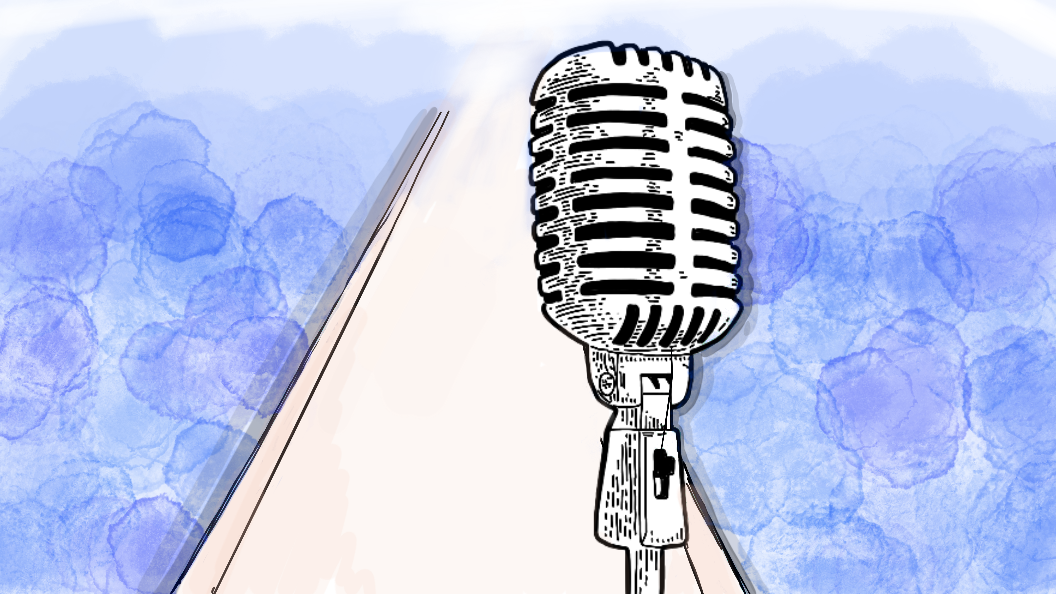
Feb 19, 2021 | Emma Drzala, Front Page News, School News
By Emma Drzala (V)
As we approach the end of the winter trimester, the Pingry community finds that it is once again time for the annual Robert H. LeBow ‘58 Oratorical Competition. The contest was founded by the Pingry Class of 1958 (LeBow’s graduating class) and William Hetfield (‘58), in honor of their classmate, Robert LeBow. Featuring six student speakers with four-and-a-half to six-and-a-half minute speeches, the assembly is consistently deemed a favorite among the school community. This year, the competition was organized by Ms. Judy Lebowitz, and was open to students from both the sophomore and junior classes. From a pool of 26 students in the preliminary round, the top six advanced to the finals: Martine Bigos (V), Elspeth Campbell (V), Caleb Park (V), Milenka Men (IV), Sophia Lewis (V), and Israel Billups (V). They will be judged by a diverse panel of teachers and administrators, as well as the past two winners of the LeBow Competition: Cal Mahoney (VI) and Noah Bergam (VI).
Of the contestants, Martine Bigos was the only one who qualified for the finals last year. This year, she wrote a speech entitled “All That’s Left.” In it, Bigos expresses her concern about our actions as high school students, and how everything we do seems to be for an end goal, rather than for our enjoyment or the betterment of society. She also discusses dishonesty in today’s world, and how the majority of students are looking for ways to “win”—whether that be getting into college, or winning a competition—rather than truly caring about what they are doing. Rather than writing about something that she did not have a passion for just because she felt the judges would appreciate it, Bigos decided to write about the need for winning in society today. There is a beauty in her speech that cannot be replicated, and Pingry students will surely be able to relate to the message of it.
Elspeth Campbell (V) wrote a speech entitled “We, the Politicians.” Her idea came about after reading a compendium of internet conspiracy theories in the New York Times. Confounded by the juxtaposition between baseless theories and factual journalism, Campbell began writing a speech about the dangerous effects of factionalism on social media. She initially believed that the exponents of such ideologies were only harming themselves. However, she soon realized that her speech seemed both prescient and naïve, and was enlightened on how misinformation is able to prevail so easily today. Campbell confronted the obvious hypocrisy of her argument wondering, “How could I, someone who was too nervous to speak in class, let alone share my political beliefs, encourage others to participate in political discussions?” Her speech became an exercise in introspection, designed to empower both herself and her peers.
The next finalist is Caleb Park (IV), with “My Dark, Beautiful, Twisted Isolation.” Park’s speech analyzes isolation during quarantine; he believes that sometimes, isolation can lead to a masterpiece, citing both Kanye West and Ludwig van Beethoven as examples of this theory. He mentions that although on a surface level, isolation appears to be a pain to us, but it actually gave us an opportunity to explore ourselves and to make time for personal growth and realization. Park also talks about his first encounter with isolation and that is where his inspiration for his speech came about. His speech is captivating in that everyone can think back to their quarantine experience and wonder if a “masterpiece” came from it.
Milenka Men’s (IV) “We’ve Kept the Mountains and Lost the Grass” is a speech about social interaction during COVID-19, and how quarantine has affected our social psyche as a community. She describes her speech as something that has “evolved into a discussion of how the structure of our social lives has been altered as a whole.” Her inspiration behind the speech came from her own personal experience with quarantine; when quarantine began, Men initially enjoyed the break and the time it gave to her. She was able to explore herself, which allowed her to realize her introverted nature. Similar to Caleb Park, Milenka takes on the difficult subject of quarantine and what it meant to her.
Next is Sophia Lewis (V) with “Self Care [sic] Isn’t Caring for Me Anymore.” Lewis’s speech discusses her frustration with self-care. She felt that recently, self-care has dwindled down to becoming superficial, which she believes is unacceptable. In her speech, she discusses self-care and what it means to her, as well as how it has come to affect her.
The final speech is “The Velocity of Fear.” Written by Izzy Billups (V), the speech is centered around the magnitude of fear in society today. Billups discusses how fear is what leads to the destruction of embracing personal thoughts and ideals. She aims to communicate that we should not fear being different, but rather embrace the idea of breaking out of the box that society has set up for us. Finally, she notes that no two people are the same, so in turn, we as a community should not conform to the pressures of society. Billups drew inspiration from a mere conversation with her sister, proving that universal truths can come to us at any moment. After realizing that both she and her sister have been making decisions based on how they would be perceived in society, Izzy decided to write a speech to combat the mentality of fear controlling so many people, thereby naming it “The Velocity of Fear.”
The competition will be held on February 19 in Hauser Auditorium. Good luck, finalists!
Feb 16, 2021 | Columns, Emily Shen
By Emily Shen (V)
March 6th, 2020: the last day that Pingry students, faculty, and staff were on campus before the implementation of masks and social distancing measures, and the last day of school as we knew it. As students shared their plans for spring break and discussed the possibility of the break being extended, no one could have predicted that COVID-19 would affect their lives as much as it did. The pandemic has disrupted the globe both economically and socially, drastically altering how people interact and how corporations operate. We watched as an event found more often in history textbooks than real life unfolded right before our eyes.
Millions of Americans have been infected with COVID-19 since last spring, and as of January 24th, more than 417,000 people have died in the U.S alone. The pandemic’s social and economic consequences — such as the loss of precious lives, the spiking unemployment rate, and necessary adjustments and sacrifices made to stop the virus’s spread — continue to heavily impact every individual and every family. Emotional consequences, therefore, tend to seem trivial in comparison and are often overlooked.
During the pandemic, many people with mental illnesses have been significantly affected and require more support. According to the Kaiser Family Foundation, before COVID-19, nearly one in every five U.S. adults reported having a mental illness, with eleven million of those adults having or previously having a serious mental illness that impaired their life in some way. In these unprecedented times, the number of those needing mental health services has only increased. As a result of the social, economic, and personal stress induced by the pandemic, more than one in three adults have reported symptoms of anxiety or depressive disorder during the pandemic, compared to the one in ten reported in 2019 prior to COVID-19. Substance abuse has also become a bigger problem during the pandemic, and without external interference, the problem has only been exacerbated over time.
Even before the COVID-19 pandemic, the U.S.’s mental health care system was failing to meet people’s needs, especially for people of color and of marginalized gender identities. Systematically oppressed people are arguably more in need of mental health services as they statistically face disproportionately higher rates of poverty, criminalization, employment discrimination, and homelessness. As the U.S. and many other countries reallocated funding to focus on doing damage control for the pandemic itself, the issue of already-insufficient funding for mental health services only worsened. According to the World Health Organization, over 60% of countries worldwide reported disruptions to mental health services for vulnerable people. Some of the most notable groups that experienced disruptions include children and adolescents (reported at 72%), older adults (reported at 70%), and women requiring antenatal or postnatal services (reported at 61%). Although WHO has recommended that countries increase their funding to cover mental health services, the cost of resolving other pandemic-related medical issues cannot be neglected. National leaders are in a challenging position as they try to balance the effects of the pandemic as a whole.
On a positive note, national and international health organizations recognize the growing significance of people’s mental and emotional health and are taking actions to ensure that individuals can take care of themselves during this time of uncertainty. For example, the Centers for Disease Control has shared information and recommendations regarding stress coping mechanisms on their online resources page. The Substance Abuse and Mental Health Services Administration has also provided resources to address the pressing issue of mental and emotional wellbeing during the pandemic. More accessible mental health care via telemedicine and teletherapy — where individuals can seek help from professionals over the phone or remotely — alleviates the stress caused by social isolation and provides patients with hope for a better tomorrow. Members of the Pingry community have been working together over the past year and supporting each other through difficult times. If you are struggling with your emotional and mental health, please seek help from your family, friends, or a trusted adult. Visit “Wellness and Support” on the Pingry website where you can find counselors and resources to address your needs. We are here for each other, and nothing is more important than staying safe and connected!
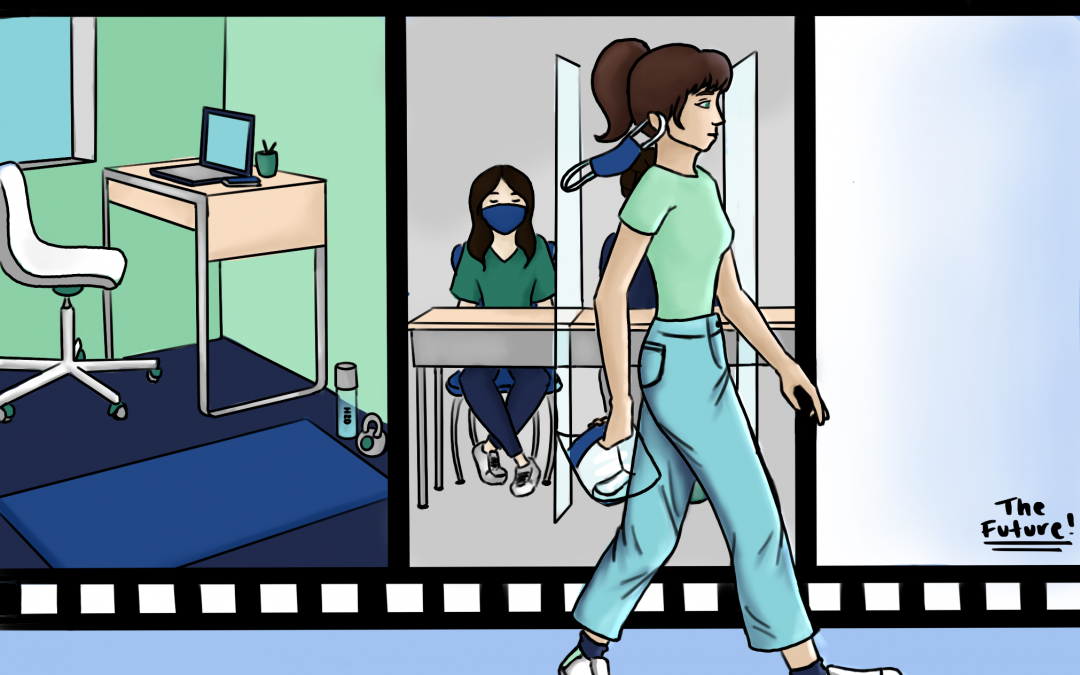
Feb 16, 2021 | Opinion, Sarah Kloss
By Sarah Kloss (V)
When reminiscing about a time before masks and social distancing, I think back to the Model UN trip right before lockdown. Actions like packing 30 kids into an elevator or gathering in groups to discuss resolutions seem almost unimaginable nearly a year later. The possibility of students from all over the country and the world coming together at a convention now feels shocking and is a reminder of how much the world has changed. Even before the trip, the virus had already begun to have an enormous impact on my life. A couple of days before I went to New York for the trip, I learned that the French exchange program that I planned on attending was canceled because of positive COVID-19 cases in Lyon, France. I was surprised and confused because I didn’t think that the virus was serious or dangerous enough to warrant the program’s cancelation. Disappointed but yet to grasp the severity of COVID-19, I continued to enjoy the weekend in New York. It wasn’t until the first week of spring break that I finally understood the full impact of the virus. While I was excitedly packing for a vacation, I learned that New Jersey had declared a state of emergency due to COVID-19 cases. Not long after, we received an email from the school announcing its transition to remote learning. At that point, I was scared and concerned for the future, but what followed in the next few months has completely altered my outlook on the world.
There are many life lessons that I learned from the pandemic. First, I now understand that family and friends are the most crucial things in my life. Before the pandemic, it was hard to find time to spend together as a family, as a result of our busy lives. Now, through having much more time with my family, I learned to cherish the moments we have with each other. Additionally, I now value the interactions I have with my friends more than I did before. During the shutdown, it was difficult for me not to see any of my friends in person, and although we would still text and FaceTime each other, it was nowhere near the same experience. Being back in-person for school, I have grown to appreciate every moment I spend with my friends. I have also discovered how to adapt to changes and become more flexible. Not everything will go the way we want it to, but we can still make the best out of the situation. Although my global program to France was canceled, I had the opportunity to participate in a virtual global program about the Balkans during winter break. While I was disappointed that the Model Congress trips were canceled this year, I was still fortunate enough to participate in the Virtual Model Congress held for the first time. Also, I learned how to cherish the small things in life and not take anything for granted. When New Jersey was in lockdown, the one thing I missed the most was playing tennis. All the tennis courts were closed and I missed the routine of playing. Because of this, when the tennis courts finally reopened, I valued being on the court much more.
I am incredibly grateful for what Pingry did over the summer, from installing the filtration system to putting up PlexiGlass dividers, so that we could come back to school for in-person learning in the fall. I could finally see my friends and teachers again, and I could play tennis for the school (something that I wasn’t sure would happen). Looking at the graph of the new COVID-19 cases both in New Jersey and the United States, I am incredibly grateful that the vaccine has come out and cases are now trending downwards. Even when the pandemic is over, I will always remember the lessons it taught me, and I look forward to squeezing in an elevator with 30 kids again.








